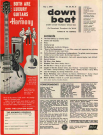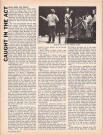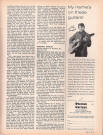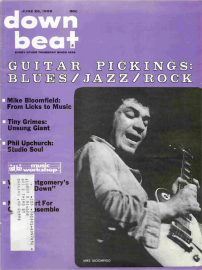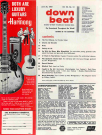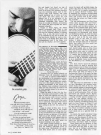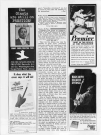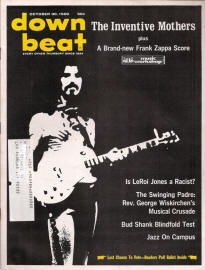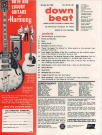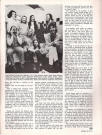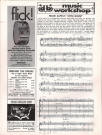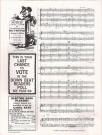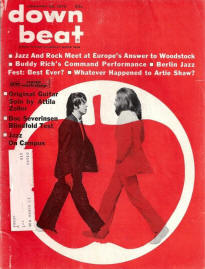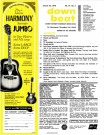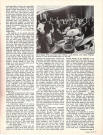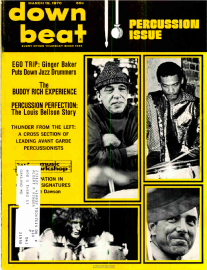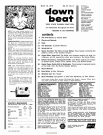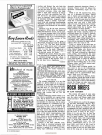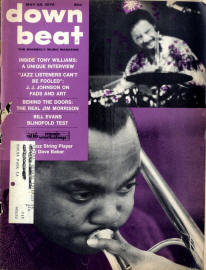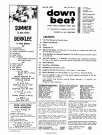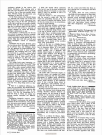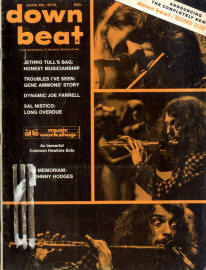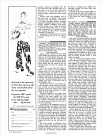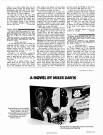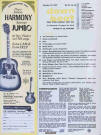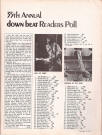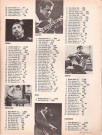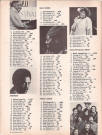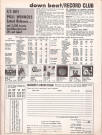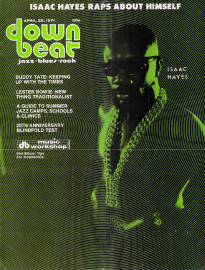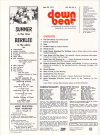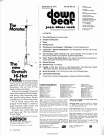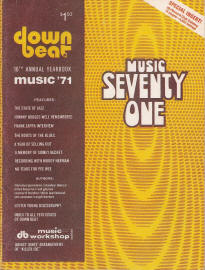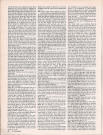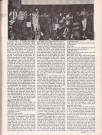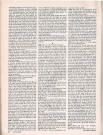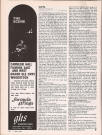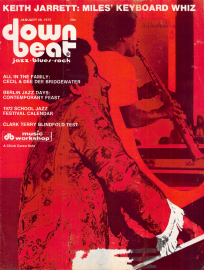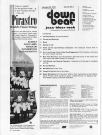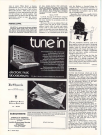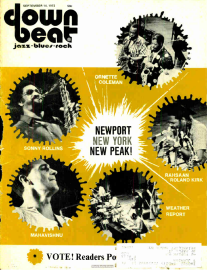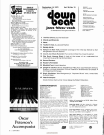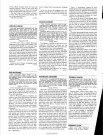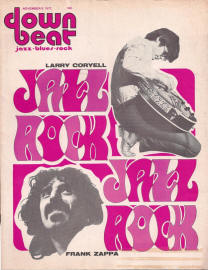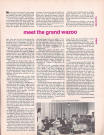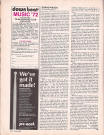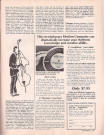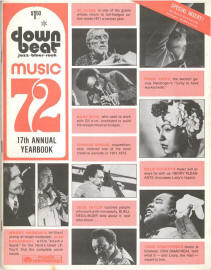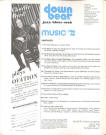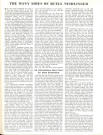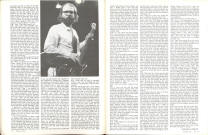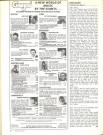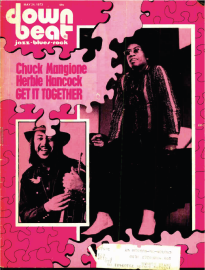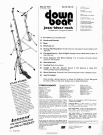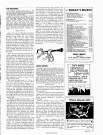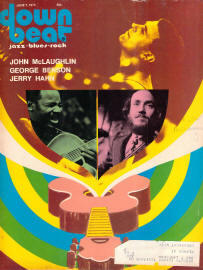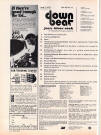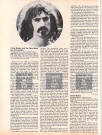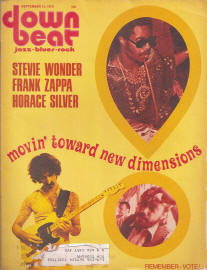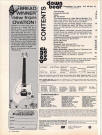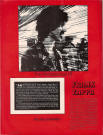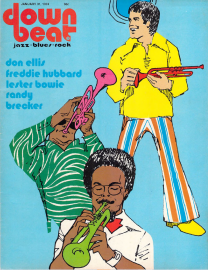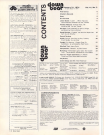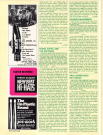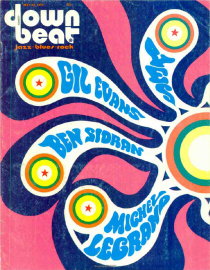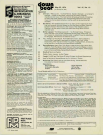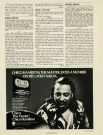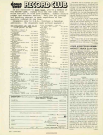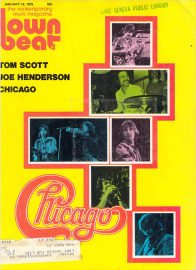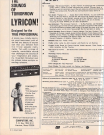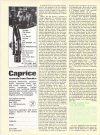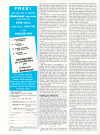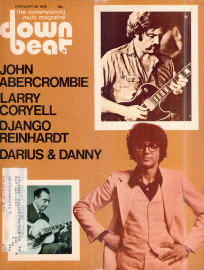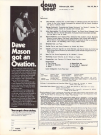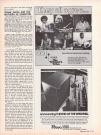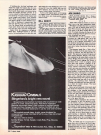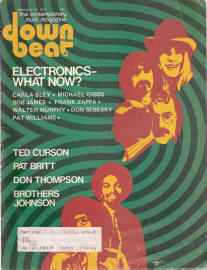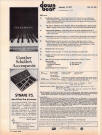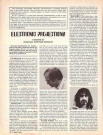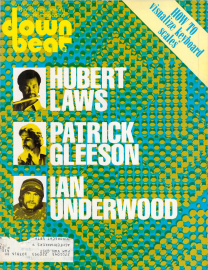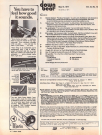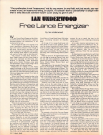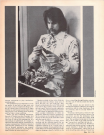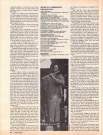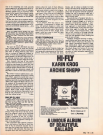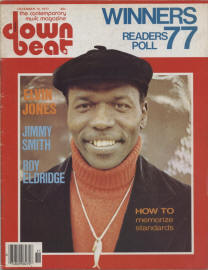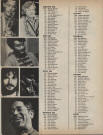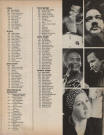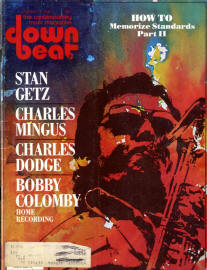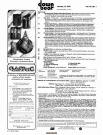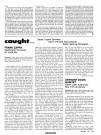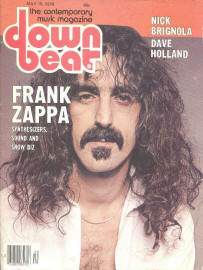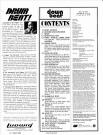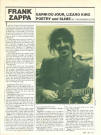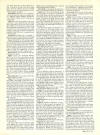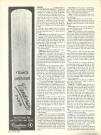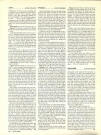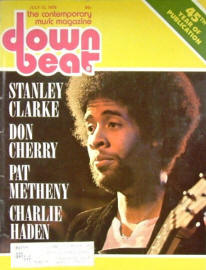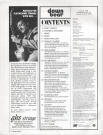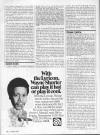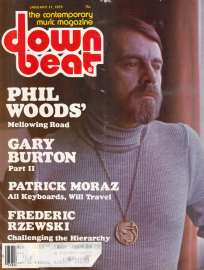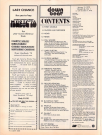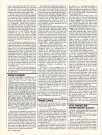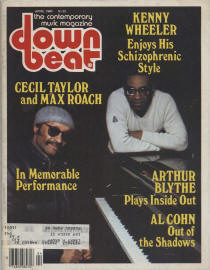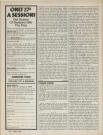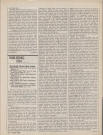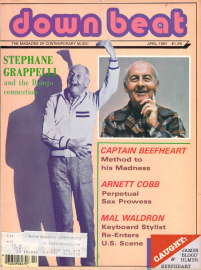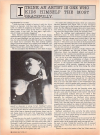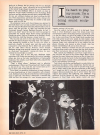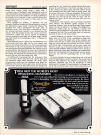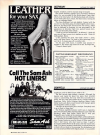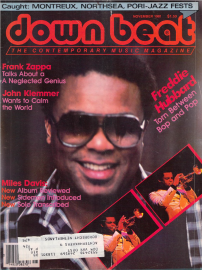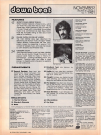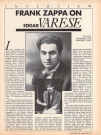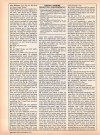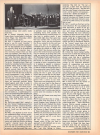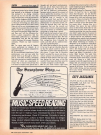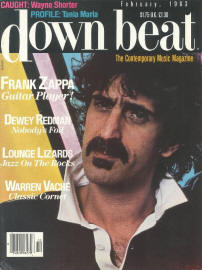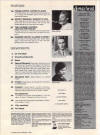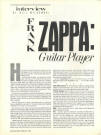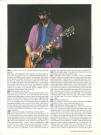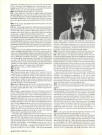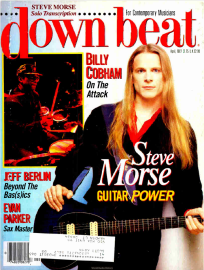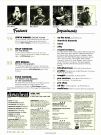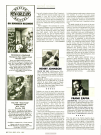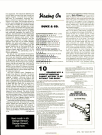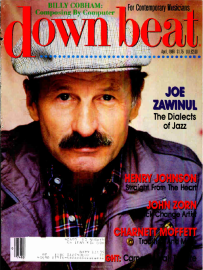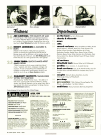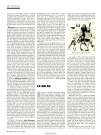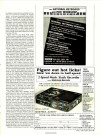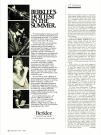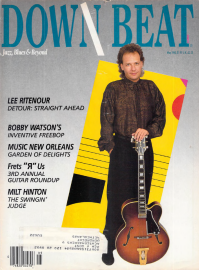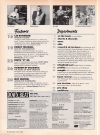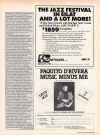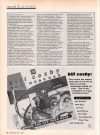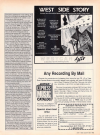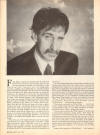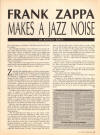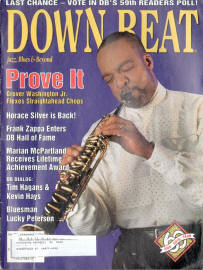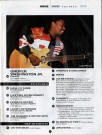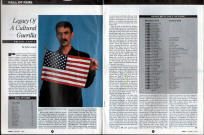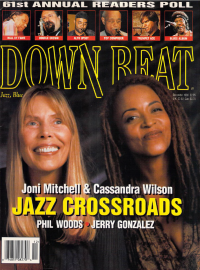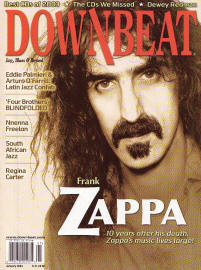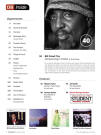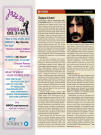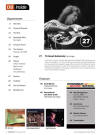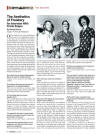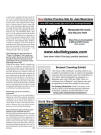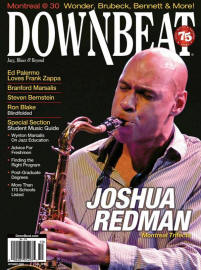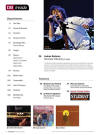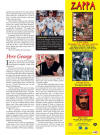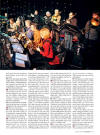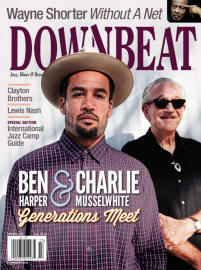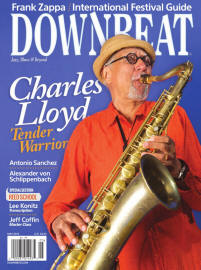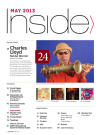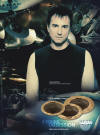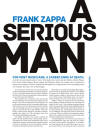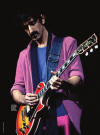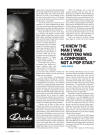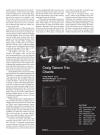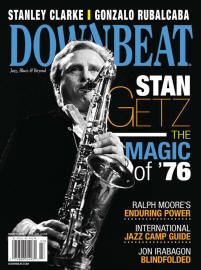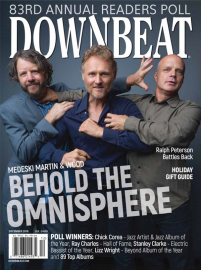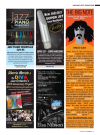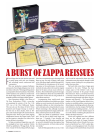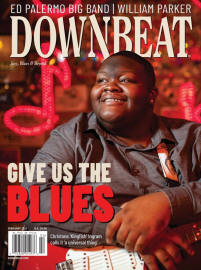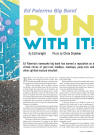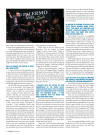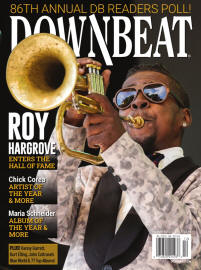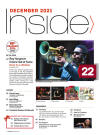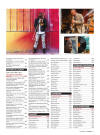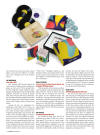DownBeat
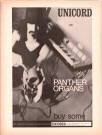 Nifty
Tough & Bitchin'
Nifty
Tough & Bitchin'
Back in 1967, Frank Zappa created an advertising agency in New
York City called "Nifty Tough & Bitchin'" as another
creative outlet associated with, but not directly tied to his
musical endeavors. This ad agency, in a very short amount of
time, mounted various professional advertising campaigns for
clients such as Hagstrom Guitars, Panther Combo Organs,
and even Remington Razor Blades in addition to art direction
for the Mother's of Invention album covers.
The Hagstrom campaign was one of the first campaigns launched
by Nifty Tough & Bitchin'. It features 3 print ads: "Nifty", "Long
and Slippery", and "Folk
Rock is a Drag", and a radio spot: "Long and Slippery".
... (hagstromguitars.com)
Similar to "Long an Slippery" ad is the "One Size Fits All" Hagstrom ad from German Guitar magazine, September 2007.
Source: slime.oofytv.set
[...] The next 45 minutes are quite literally indescribable. The Mothers of Invention are a nine-member band who make the East Village look like a Brooks Brothers showroom. Musically, they can play anything from early Basie to late '50s schlock-rock to concepts out of a Varèse-Cage-Stockhausen panorama. Can play them; each musician is highly gifted, and the Mothers are a tightly disciplined, responsive aggregation. (read more)
Source: slime.oofytv.set
What Zappa and the Mothers do they do superbly, and, although I want more from music than they have to offer right now, this set is brilliant entertainment. (read more)
Source: slime.oofytv.set
1969 October 30
Vol. 36 No. 22
(1) Frank
Zappa: The Mother of Us All
A meditation on the manifold implications of the Mothers of
Invention.
By Larry Kart, pp 14-15
(2) Music Workshop: Little House by Frank Zappa
Score, pp 31-33
(1) Zappa is standing onstage in front of 10,000 or so people, most of them under 21, at an open-air concert last summer. He says to the audience, "We've just had a request for Caravan with a drum solo" (the fruit of their routine on America Drinks & Goes Home). Laughter. (read more)
1970 January 22
Vol. 37 No. 2
Europe's Answer
To Woodstock: The First Actuel Paris Music Festival
By Jane Welch, pp 16, 17, 31
[...] If any single individual could be said to represent the spirit of those attending the Festival, it was its co-host, the music-loving Mother of Us All, Frank Zappa. Exuding intelligence, wit and wry humor, Zappa darted around like a 2001 Fred Astaire, charming everyone in sight and becoming a friend to all. (read more)
Source: slime.oofytv.set
The constant temptation is to say that Zappa is a genius (which he is) and consequently to rank highly all his offerings. I've done it; but the four stars should indicate that there is a good deal of utterly inspired music here, plus a lot of straight ahead rock 'n' roll which is good and groovy and virtuoso and all, but not breathtaking. (read more)
Source: slime.oofytv.set
Take all the worst qualities of the Mothers of Invention: self-congratulatory pride in being freaky, in mouthing currently fashionable obscenities and discussing perverted sexual fantasy trips on record, in being better than the assorted creeps they satirize. Add to that an irrevocable absence of any musical talent whatsoever, in composition, lyric-writing or performing. Voila: the GTO's. (read more)
Source: Fulvio Fiore, worldradiohistory.com
1970 June 25
Vol. 37 No. 12
The Mothers Of Invention:
Burnt Weenie Sandwich
By Alan Heineman, pp 22-23
It may well be that in the year 2000 (we should live so long), the Mothers' music will be considered the highest level of music attained during the present period. (read more)
Source: Fulvio Fiore, worldradiohisory.com
1970 December 10
Vol. 37 No. 25
The Mothers
Of Invention: Weasels Ripped My Flesh
By Mike Bourne, p 27-28
Any album by Frank Zappa should seem a special moment – but he is too seldom offered that sort of reverence, no doubt because to so many his music sounds odd. But then the music of Frank Zappa is odd, and brilliant by that very abnormality. As a composer, as an arranger, even as a guitarist, he is seldom equalled in rock, if indeed his music may be so simply classified. (read more)
Source: worldradiohistory.com
Chunga's Revenge is, as always, excellent music by Frank Zappa, in spite of my few crabbings. (read more)
Source: worldradiohistory.com
I don't know if Frank Zappa is a genius, but he is certainly a very talented man, and an honest one. He can even poke fun at his own egocentricity, and his humor never becomes dehumanizing or malicious. 200 Motels is good, clean dirty fun, a genuine work of the imagination, and highly recommended. (read more)
ON THE FOURTH OF JULY, Frank Zappa played the second of two Indianapolis concerts. At that time, the new Mothers of Invention revealed themselves surely the most consummately brilliant ensemble of musicians performing in the rock idiom: Ian Underwood, keyboards, tenor sax; George Duke, keyboards, ring modulator; Zappa, guitar; Jeff Simmons, bass, vocals; Aynsley Dunbar, drums; Howard Kaylan and Mark Volman, percussion, vocals. (read more)
Source: slime.oofytv.set
Perhaps after one has seen the film, the record might make it. But without seeing, hearing alone is a difficult experience. Of course, any and all music by Zappa is sometimes exciting, even if as here it proves more a creative puzzle than a whole piece. (read more)
Source: worldradiohistory.com
In all, Just Another Band again proves the Mothers among the best ensembles and Zappa among the hest composers in popular music. (read more)
Source: worldradiohistory.com
1972 November 9
Vol. 39 No. 18
Meet The Grand Wazoo
Harvey Siders investigates a new Frank Zappa sound, pp 13, 36
We all know that necessity is the mother of invention. I'd always maintained that Pat Pending is the father--until I discovered that the real father is a mother: Frank Zappa. (read more)
Excerpt from the article about Frank Zappa:
A.H. : Have you got a course title, or –
B.N.: Oh, no. I’m a free teacher. We’re all free teachers at the California Institute of the Arts. We’re free, according to our dean [1], anyway, to teach on a one-to-one basis whenever they want. Like, if you play the clarinet but you wanna know what’s the highest note you can play on a bass, I’ll try and tell you, you know? It’s one of those schools where if you want to know something, you go see if you can find out.
A.H. : That was the idea of schools originally, but it doesn’t seem to’ve worked out that way.
B.N.: Yeah, they mucked it up. So you’re not a slave to the registrar’s office is the idea of this school. So that, and then I was gonna work with Frank (Zappa).
A.H. : How did that come about?
B.N. : That came about – well, Frank knew my work from Cecil’s recordings, and I knew Ian Underwood from when I went to Yale; he was just coming in, or he was around, or something like that, and so when the Mothers were at the Ark in Boston last spring, I went over and Ian came over to my house with that guitar player (Paul Lenart) and the drummer from the Far Cry, who’s a good rock ’n’ roll drummer. Plus, Frank called me up about five in the morning from his Boston hotel room and said something – what was it? I don’t know, but I got very excited, because I thought I could join the Mothers right away. I think he was looking for another bass player, or maybe he wanted me plus Roy (Estrada), because I didn’t see how he could get rid of Roy ’cause Roy is, like, the greatest rock ’n’ roll bass player there is, get right down to it, and perfect for what Frank’s music was at that time. I think Frank was tired of – like, Roy couldn’t read music, see, which I wanted to get to last; see, I can read music, and Frank can write music. I think that’s why there’s no more original Mothers. ’Cause he got very tired of writing music and having it screwed up because someone smoked one poke too many or the light show went on in the middle of a number of something. Then he called later and asked me to record with Jean-Luc Ponty for World Pacific and Dick Bock. And I flew out there and made these sessions with him. [King Kong] Got tight. Stayed over at his house and had a lot of fun together, played a lot of music.
A.H. : How did you like the record date?
B.N.: Well, you see, Frank is such a great mixer, meddler, that I’m sure (laughs) it bears no resemblance to what we laid down there. He’s a genius with that shit, man, with the mixing and speeding up and – he’s a genius, man, that’s all there is to it. I’m lucky to have known two, now; that’s two that I’ve been able to play music with. (Pauses) Very fortunate. Frank and Cecil. (pauses) Lukas Foss is not a genius.
B.N.: (Jams mike close to his mouth) I must enunciate clearly that I shit on the Don Ellis movement in music.
[1] According to other B.N. interview "While I was with the BSO, I went out [to California] to record with Frank Zappa on October 19, 1969. That’s a date I’ll never forget because it was a turning point in my life. That day I met Mel Powell, who was the dean of music at the new school and had been interested in hiring me. After our meeting in Frank’s basement he hired me and I went to Cal Arts."
Source: slime.oofytv.set
After a few years of fronting a band that specialized in comedy routines and musical parodies. Frank Zappa last year released an album under his own name called Waka/Jawaka that heralded a welcome return to music for music's sake. The Mothers' new album can be seen as a continuation of some of the musical ideas expressed therein, and it strongly indicates two things. First, Zappa remains as inventive and resourceful a composer, arranger and player as ever; and second, he has obviously been listening to a lot of jazz lately. (read more)
Source: worldradiohistory.com
Because the state high school basketball tournaments were in town, the conversation in the Holiday Inn lobby among trombonist Bruce Fowler, pianist George Duke and down beat took place over and around the heads of a phalanx of cheerleaders who, upon discovering the Zappa group in their midst, seemed ready to turn in their uniforms for the jeans and halters of the groupie. (read more)
It may have been one of the most unusual down beat award presentations in the recent history of such events. The award "ceremony" involved the presentation of the Pop Musician of the Year award to Frank Zappa and the Best Violinist award to Jean-Luc Ponty made by managing editor James P. Schaffer. (read more)
1973 September 13
Vol. 40 No. 36
The Perspective
of Frank Zappa:
Frank Zappa gives his viewpoints about his music, his musicians,
and the business of music as elicited by Jim Schaffer, pp 14-15,
36
db: What about the bands educational backgrounds?
ZAPPA: Ian has a couple of degrees – a bachelor's
and an MA in music. I think everybody in the group has a degree
except me. They are all thoroughly trained, schooled musicians
with either jazz or rock backgrounds. Ruth has more of a classical
background. She's a Juilliard product. (read
more)
Compared to all the schlock being vomited onto the market these days, Over-Nite Sensation is a glass of quality cognac. (read more)
Source: worldradiohistory.com
As a matter of fact, so is the whole album. Apostrophe (') is very good, but maybe we should be able to say more about Frank Zappa. (read more)
Source: worldradiohistory.com
The latest Zappaplatter finds der Frank basically uncontaminated by his tasteless encounter with the yellow snow. Vulgarity has at last catapulted Zappa onto the singles charts and for all those who were titillated by the excrescences of Apostrophe, the new session will come as another abnormality. (read more)
Source: worldradiohistory.com
1976 February 26
Vol. 43 No. 4
Frank Zappa &
The Mothers of Invention: One Size Fits All, Bongo Fury
By Mikal Gilmore, pp 27-28
Frank Zappa has so much going for him as a musical mind that even his less-than-excellent collections come across as virile and fleshy albums. On One Size Fits All, Zappa furthers his satiric and musical visions of rock and jazz on a small scale, crowded with a near surfeit of stock imagery. He shares the vinyl with Capt. Beefheart on Bongo Fury, his latest release, and both sound as they haven’t in ages. (read more)
Source: worldradiohistory.com
FRANK ZAPPA: I like electronic music, I think it will be around for a long time. I think that the instruments are going to have to be designed so that they're easier to operate in live performance situations.
On Zoot Allures (Zappa's newest album), most of the electronic events that are taking place are things that were done with studio electronics. There are some synthesizer things that I played on the album, but they're real simple-minded.
Electronics, for instance the string synthesizer, is the
best thing that could happen to pop music because when you consider
the attitude of normal string players, even jazz string players,
it's so disgusting doing business with them that it's
great that somebody has finally invented a box (the string synthesizer)
that will help you do away with them and their aura. If you
can get a better sound by using real musicians I would prefer
to do it. But unfortunately the attitude of those kind of musicians
toward the work that they do is so moribund, it just adds a
cloud.... People are more worried about their pensions than
the notes that they're playing, and I hate to do business
with them. Working with many so-called "studio musicians,"
all they care about is their pensions, going to their union
meetings, and maintaining their position in a musical community
that has nothing to do with music, but more to do with, you
know, really horrible middle-class, middle-of-the-road lifestyle.
It's depressing for me, in most instances, to deal with
them, because they do not have my musical interests at heart,
and I doubt if they have anybody's musical
interests at heart when they come in to do those sessions. All
you gotta do is stand in the hallway during one of their little
union breaks and listen to their conversation, then you know
where it's at. And it's the same thing in symphony orchestras.
So thank God somebody put together a box that'll sound like
a string section, because in a hockey rink who can tell the
difference?
As for where music will be in ten or fifteen years, all the jazz musicians will forget how to improvise and really get good at playing disco music. Each one of them will have three cars and a house in the country.
Source: slime.oofytv.set
1977 May 19
Vol. 44 No. 10
Ian Underwood
– Free Lance Energizer
By Lee Underwood, pp 18-20
Frank Zappa:
Zoot Allures
By Russell Shaw, p 25
1978 May 18
Vol. 45 No. 10
Frank Zappa - Garni
Du Jour, Lizard King Poetry And Slime
Interview by Tim Schneckloth, pp 15-17, 44-46
Schneckloth: In the last few years, it seems you've
been going away from larger orchestrated things back to a fairly
basic rock band format. Is there a conscious
reason for that?
Zappa: No, I do whatever I feel like doing. See, all you know
about what I've done is what's been released on records. And
all you know about that is what you've listened to. (read
more)
Source: home.online.no/~corneliu & zappateers
If James Brown is the godfather of funk, then that must make Frank Zappa the godfather of punk, right? Well, yes and no. Zappa’s first album, Freak Out, is still the quintessence of creative vitriol, and over the years he has been instrumental in cutting through fascistmentality censorship, so’s now you can say all ’dem naughty words on record and be an antisocial freak and all – I mean, I knew kids who were thrown out of their homes for having copies of Absolutely Free. (read more)
Studio Tan may be unauthorized, but, like Zappa’s best work, it’s both emotionally satisfying and a lot of fun. Records like that are rare. (read more)
Frank’s longstanding gripes with Warner Brothers seem to have been justified, judging by the record sales figures of Sheik Yerbouti and now the rock opera Joe’s Garage on the Zappa label. Abandoning his middle period flirtations with jazz improvisation and contemporary orchestration, Zappa has reverted to the conceptual doo-wop format he last employed on the Mothers’ Kafkaesque exercise in cosmic paranoia We’re Only In It For The Money. (read more)
“My music is terribly personal,” Don Van Vliet says, his eyes fixed intently on me. “I think any artist is that way. I think there’s a lot of people out there that are kidding about art. I mean, literally kidding.”(read more)
Source: worldradiohistory.com
1981 November
Vol. 48 No. 11
Frank Zappa On Edgar
Varèse
Interview by John Diliberto & Kimberly Haas, pp 19-21, 64
John Diliberto: How did you first find out about Edgar Varèse?
Frank Zappa: That's a very simple story. I read an article in
Look magazine in the early '50s which was a feature
saying what a great guy Sam Goody was because he was such an
exciting merchandiser and he could sell anything, he could sell
any kind of record. (read
more)
Source: home.online.no/~corneliu, worldradiohistory.com
1983 February
Vol. 50 No. 2
Frank Zappa: Guitar
Player
This Mother's music, lyrics, and attitudes are legenday, so
for a change, Bill Milkowski talks to Frank about his instrumental
prowess, pp 14-17, 46
Bill Milkowski: You were actually composing classical
music before you ever picked up a guitar, then at the age of
16 you got hooked on r&b music. What was the early fascination
there?
Frank Zappa: Well, let's face it, there's nothing that
sounds like an electric guitar. (read
more)
This has got to be Frank's favorite album among all 50 or so he's recorded since 1966's Freak Out. It sounds so good – crisp, precise, crystalline, executed with sheer perfection by the ultimate music machine of the day, the incredible Synclavier. (read more)
Source: worldradiohistory.com
It's hard to believe that Frank Zappa, guitarist, composer, bandleader, social critic, studio engineer, marketing strategist, filmmaker, defender of democracy, and inventor of the term " hot and bulbous," among other things, has been hanging around the fringe of the musical world for over 20 years now. But it's true; I've got the proof right in front of me – the first 12 CDs in the projected Complete Works Of Frank Zappa to be issued by Rykodisc, an adventurous CD-only company. (read more)
Source: worldradiohistory.com
The following 17 CDs on Rykodisc, spanning 21 years, reveal a few things about Frank Zappa: His guitar playing has improved dramatically since the ’60s while his social commentary has become more pointed and preachy in recent years (see Apr. ’88’s first roundup of FZ material); and, the musical standards of his ’80s bands have risen far above those of their ’60s counterparts. (read more)
Source: worldradiohistory.com
Frank Zappa is both proud and pissed-off. His 1988 road band has been history for more than three years now but he's been reliving the triumphs and frustrations of that band ever since. (read more)
Shortly after Frank Zappa's death, his daughter Moon Unit was on the 818-PUMPKIN Zappa hotline informing mourners that in lieu of flowers they could send donations in her dad's name to the Office for Intellectual Freedom of the American Library Association or to a favorite environmental cause. For those musicians and listeners financially restricted. Moon suggested. "Just play his music. . . . That will be enough for him." (read more)
Political advocate and subversive satirist, comedian, scatologist, classical composer of works from chamber music to musique concrete, pan-time cynic, part-time optimist, pedagogue, bandleader, and bitchin' guitarist, the Grand Wazoo Frank Zappa enters the Down Beat Critics Hall of Fame in 1994. (read more)
1999 July
65th Anniversary Issue
Hall of Fame
Outcasts: Jimi Hendrix & Frank Zappa
By Dan Ouellette, pp 92-93
Frank Zappa died 10 years ago, on Dec. 4, 1993 , at the age of 52. His relentlessness as a composer, guitarist and bandleader resulted in one of the most prolific musical careers of the 20th century. (read more)
In this 75th anniversary collector's edition Zappa's interview from Music 71 Yearbook was reprinted, but only the first part and with different photo.
 Jeff
Lindberg, artistic director of the Chicago Jazz Orchestra (CJO),
had always been toying with the idea of presenting the music
of late rock composer Frank Zappa. The CJO has the reputation
of focusing on a less controversial repertoire that includes
Count Basie, Duke Ellington and Ahmad Jamal. But on the evening
of Dec. 29, Lindberg’s plan came to fruition at Chicago’s Park
West.
Jeff
Lindberg, artistic director of the Chicago Jazz Orchestra (CJO),
had always been toying with the idea of presenting the music
of late rock composer Frank Zappa. The CJO has the reputation
of focusing on a less controversial repertoire that includes
Count Basie, Duke Ellington and Ahmad Jamal. But on the evening
of Dec. 29, Lindberg’s plan came to fruition at Chicago’s Park
West.
Full digital edition pdf: Down Beat, March 2013
Source: Vitaly Zaremba
In addition to the article by Geoffrey Himes on page 84 is an announcement, that M&T Syracuse Jazz Fest XXXI, Syracuse, July 4-6 includes a 20th anniversary tribute to Frank Zappa. (Full digital edition pdf: Down Beat, May 2013.)
See also Frank Zappa: A serious man by Geoffrey Himes in DownBeat, May 2013
Source: Down Beat, May 2013

 Zappa
And Jazz: Did It Really Smell Funny, Frank by Geoff
Hines reviewed.
Zappa
And Jazz: Did It Really Smell Funny, Frank by Geoff
Hines reviewed.
Full digital edition pdf: Down Beat, March 2016
Source: Down Beat, March 2016
In addition to the article by Geoffrey Himes, which includes a review of The Big Note by Charles Ulrich, on page 56 is Zappa Plays Zappa band listed in readers poll results.
Full digital edition pdf: Down Beat, December 2018
Source: Down Beat, December 2018
On page 41 under Reader's Poll Results is Zappa Original Motion Picture Soundtrack listed.
Full digital edition pdf: Down Beat, December 2021
Source: Down Beat, December 2021


